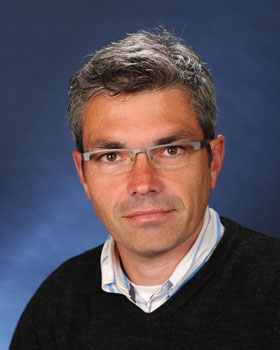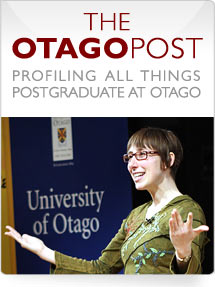 Friday 11 March 2016 12:08pmThe Otago Post issue 9
Friday 11 March 2016 12:08pmThe Otago Post issue 9
University of Otago's Applied Science programme director, Dr Stephen Sowerby
A commitment to solving real-world problems is what Dr Stephen Sowerby seeks in students wanting to enter the Master of Applied Sciences Programme.
“Masters degrees in the Applied Science majors are industry-focused,” emphasises Dr Sowerby, who is Director of the University's Applied Sciences programme. “They're intended to provide graduates with interdisciplinary research skills sought both in New Zealand and internationally.”
A one-year thesis-only Master of Applied Science has been available for some years, but a new two-year Masters degree and a Postgraduate Diploma, both incorporating taught papers, are available from 2012. A one-year, thesis-only Masters of Applied Science in Bioengineering was introduced earlier this year too.
Dr Sowerby says Applied Science's suite of undergraduate and postgraduate degrees is designed to prepare students for a science-based career focused on creating practical solutions or products for everyday life in industries as diverse as food sciences, energy management, computers, geology, clothing and textiles, telecommunications and aquaculture.
“The Masters programme is supported by an industry advisory group, providing us with an intimate connection with industry. It creates the potential to marry a Masters student's interests with technical industry problems or ideas, and come up with marketable solutions.”
The programme is part of a long-term plan to strengthen Applied Science's postgraduate culture.
“Prior to 2009 there was a four-year undergraduate degree, but its graduates didn't tend to go on to the one year Masters or a PhD. Most applicants [for those degrees] didn't come from the Applied Science degree and they had trouble entering. The introduction of taught papers into the Masters programme eased that, allowing graduates from diverse backgrounds to fill any knowledge gaps,” says Dr Sowerby.
“To help grow a Masters culture, we changed the undergraduate system, removing the obligatory 72 Commerce points. Now you do an Applied Science major and an obligatory minor, but that minor can come from anywhere in the University – no other degree in the University does this.”
“It allows students to focus their degree early. We had feedback, for example, that the industry was seeking graduates with a telecommunications-related major and a minor in Politics to give them lobbying skills. One student wanted an aquaculture-related major with a minor in Māori Studies to better understand the cultural perspective. It's not for everyone, but there are people who know exactly what they want to do. Our message is do what you like and do a very good job of it.”
The new Masters of Applied Science in Bioengineering enables engineering or numerical and physical science graduates who have non-biological backgrounds to enter bioengineering research.
“For example,” says Dr Sowerby, “I may require a piece of technology for bio-analytical research and there might be an electronics student who can build that device. With the new bioengineering Masters degree we can say, 'if you've done physical and numerical sciences or engineering to 400 level, we'll give you the necessary biology skills to progress that project'.”
For more information visit:
